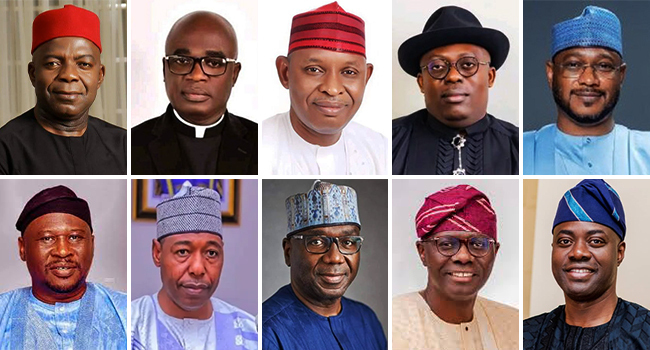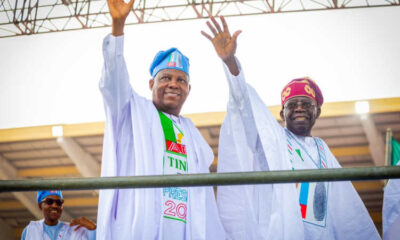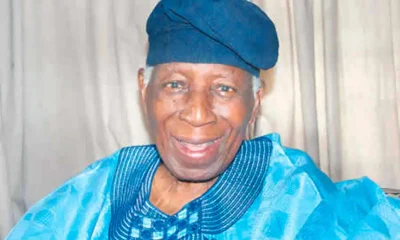News
29 states spend N2 trillion on travels, others – Report

A total of 29 state governors spent N1.994 trillion on recurrent expenditures, including refreshments, sitting allowances, travelling, and utilities in the first nine months of 2024, findings have shown.
It was also gathered that the states obtained a N533.29bn loan, while it spent N658.93bn to service its debts owed to local, foreign, and multilateral creditors, reports The PUNCH.
However, these states fell short in their revenue-generating targets, collecting a total sum of N1.92tn as internally generated revenue but fell short of the revenue target of N2.868tn, recording a deficit of N948.28bn.
The recurrent data utilised in this report did not include personnel costs.
An analysis of the fiscal performance of each state, utilizing data from the Q1 to Q3 budget performance reports obtained from each state’s website, revealed a pressing need for stringent measures to prioritise fiscal discipline, especially amidst growing calls to reduce the costs of governance.
This comes despite a 40 per cent increase in the state’s statutory allocations from the Federation Account.
For the first three quarters of the year, our correspondent examined budget implementation data from twenty-nine states; data for six states was not available.
Borno, Gombe, Kaduna, Kano, Kwara, Sokoto, and Ogun states were the ones without the latest data from January to September 2024.
Since the commencement of the current administration, state governments have enjoyed improved monthly allocation mainly due to the elimination of fuel subsidies and the unification of the foreign exchange market.
The Nigeria Extractive Industries Transparency Initiative recently noted that the Federation Accounts Allocation Committee disbursed N3.473tn to the three tiers of government in the second quarter of 2024.
This reflects an increase of N46.77bn (1.42 per cent) compared to the first quarter of 2024.
The federal government received N1.102tn, representing 33.35 per cent of the total allocation, while 36 states received N1.337tn (40.47 per cent), and the 774 local government councils shared N864.98bn (26.18 per cent).
A comparison with the previous quarter shows that the Federal Government’s allocation decreased by N41.44bn (3.76 per cent), while state governments saw an increase of N58.13bn (4.29 per cent), and local government councils experienced a rise of N30.82bn (3.57 per cent).
But this improved funding hasn’t translated to an improved standard of living for its citizens.
A breakdown showed that the 29-state government spent N1.994tn on its recurrent expenditure, which included refreshments for guests, sitting allowances to government officials, local and foreign travel expenses, and utility bills.
The general utilities include electricity, internet, telephone charges, water rates, and sewerage charges, among others.
Lagos, Plateau, and Delta States spent the highest on their operating expenses, incurring a cost of N375.19bn, N144.87bn, and N121.54bn, respectively. This was followed by Ondo and Bauchi spending N107.34bn and N99.31bn.
Niger State, under the leadership of Governor Mohammed Umar Bago, was the highest borrower within the review period, obtaining loans worth N79.09bn. Katsina followed with a loan of N72.89bn. Oyo State also got a loan of N62.48bn.
In terms of revenue, Lagos State collected the highest of N912.17bn, followed by Rivers State with a collection of N269.18bn. Third on the list was Delta (N97.02bn).
A state-by-state analysis revealed that Abia State, led by Governor Alex Otti, spent N17.91bn on operating expenses and generated N22.15bn in revenue, falling short of the N32.14bn revenue target. Additionally, the state borrowed N3.901bn and allocated N10.91bn for debt servicing.
Adamawa State spent N41.45bn on recurrent expenditure, while it earned N9.16bn income out of its revenue of N22.24bn. This state borrowed N10bn and paid N22.68bn to service its debts.
Akwa-Ibom State recurrent spending reached N85.45bn in nine months, N43.98bn more than its generated revenue of N41.47bn in nine months. The state paid N34.47bn as debt service but didn’t borrow.
Anambra State generated more revenue (N28.296bn) than its recurrent spending of N12.70bn. It spent N4.56bn on debt service and didn’t record any borrowing.
The Bauchi government spent N99.31bn on its operating expenses. This state only got N15.92bn out of its budgeted target of N37.03bn but borrowed N33.64bn and paid N27.54bn as debt service.
Bayelsa state got N57.85bn IGR more than its revenue target of N23.87bn. It spent N75.23bn on its operating costs and spent N30.54bn on its debt service.
Governor Hyacinth Alia of Benue state approved the spending of N29.45bn for operating expenses while it collected N8.71bn as revenue out of an N23.91bn target. This state didn’t borrow but spent N5.48bn to service previous loans collected.
Similarly, Cross Rivers spent N55.73bn on recurring expenses, collected N32.42bn IGR, borrowed N20.67bn from its creditors and spent N19.99bn on debt service.
Delta State recurrent expenditure reached N121.54bn in nine months while it earned N97.02bn as revenue out of the N110.3bn target. The oil-rich state serviced its debt with N55.9bn and didn’t obtain any loan.
Also, Ebonyi State spent N37.73bn on its recurrent expenses but earned N15.67bn as revenue. The state borrowed N15.65bn and spent N8.46bn on debt service.
Edo State spent N75.78bn on recurrent expenditure but generated N52.68bn revenue. The state borrowed N12.84bn and spent N27.5bn on its debt service commitments.
Similarly, Ekiti State recurrent spending was N74.73bn, generated N23.16bn revenue, borrowed N11.75bn and spent N12.93bn to service its debts.
Enugu State spent N10.88bn on its operating expenses but got N39.98bn in revenue. This state borrowed N1.39bn and spent N6.93bn on its debt service.
Imo State under Governor Hope Uzodinma, spent N42.75bn on its operating expenses but got N15.24bn as revenue. This state spent N15.94bn to service its debts but didn’t obtain any loan.
While Jigawa incurred N35.69bn as operating expenses, it collected N18.41bn as revenue out of its target of N50.65bn borrowed N744.75m, and N2.17bn on debt service.
Further analysis showed that Katsina State spent N40.73bn on its recurrent expenditure while it generated revenue of N29.95bn. This state increased its loan by N72.89bn and paid N12.78bn as debt service.
Kebbi State recurrent spending was N22.42bn while it generated N7.86bn revenue. It also obtained an N24.59bn loan and paid debt service of N3.42bn.
Kogi State spent N84.48bn on its operating expenses but earned N19.86bn in revenue. The confluence state also obtained N51.68bn as loans and repaid N18.12bn debt.
Lagos State spending on recurrent expenses was N375.19bn, while it earned N912.15bn revenue. The state paid N84.53bn as debt service but didn’t obtain any loan.
Within the same period, Nasarawa spent N42.63bn on its operating expenses but got N22.78bn as revenue, Niger state recurrent expenses reached N41.28bn while it earned N29.22bn.
Ondo State spent N107.34bn on recurring expenses but only earned N24.43bn, Osun State spent N48.87bn but earned N28.86bn as revenue while Oyo State spent N51.24 on its recurrent expenditure, N45.79bn was collected as revenue.
Plateau spent N144.86bn on its recurring expenses but only earned N18.03bn; Rivers State’s spending on its operating costs was N72.69bn, but it earned N269.17bn.
Taraba State spending on recurrent expenditure reached N58.39bn, surpassing its revenue generation of N7.84bn, resulting in a deficit of N50.55bn. This state borrowed N52.63bn and paid N21.19bn.
Yobe State spent N51.29bn on its recurrent costs but earned N8.14bn as revenue. Also, Zamfara spent N36.34bn on its recurrent expenditure but earned N18.46bn.
Commenting in an interview, A professor of Economics at Babcock University, Segun Ajibola, stated that the enduring problem of high governance expenses had persisted at the state level, with inadequate oversight and accountability resulting in minimal economic benefits for grassroots citizens.
Ajibola, a former president of the Chartered Institute of Bankers, lamented that state assemblies had also abandoned their oversight duties, leaving the state governors to operate with no iota of transparency and accountability.
The Fiscal Responsibility Commission last week expressed concerns over Nigeria’s current fiscal federalism structure, cautioning that the system may be unsustainable in its present form. ( Culled from PUNCH)
News
Chelsea, Brentford shares the spoil in premier league’s goalless draw

Chelsea’s frustrations on the road continued on Sunday as they played out a drab 0-0 draw against Brentford in the Premier League. The fourth-placed Blues, desperate to solidify their position in the race for Champions League qualification, delivered another uninspiring display under manager Enzo Maresca. Much of the attention was focused on the decision to bench England forward Cole Palmer for almost an hour, sparking questions about the Italian boss’s priorities ahead of a crucial UEFA Conference League quarter-final clash with Legia Warsaw on Thursday. When Palmer was finally introduced, his impact was muted, with his only significant contribution being a missed chance over the crossbar.
Chelsea have a UEFA Conference League quarter-final trip to Legia Warsaw on Thursday, but Maresca’s priorities were questioned following the Blues’ insipid display.
The match itself offered little excitement, highlighting the struggles of both sides. Brentford, battling their own challenges of form at home, seemed unable to capitalize on Chelsea’s sluggish performance. Despite the Blues’ attempts to gain control, Maresca’s cautious tactical approach failed to generate clear-cut opportunities for his team. With Chelsea winless away from home in the league since December, the encounter at the Brentford Community Stadium was emblematic of their recurring troubles on the road. Fans and analysts alike questioned whether Maresca’s approach was adequate for a team still fighting for Champions League qualification amid an increasingly competitive field.
The spotlight on Cole Palmer’s absence from the starting lineup was another defining feature of the match. The England forward, widely regarded as a key player for Chelsea this season, could have provided the creativity and attacking edge the Blues sorely lacked throughout the game. Maresca’s decision to hold Palmer back drew criticism, especially given the urgency of securing vital points for Chelsea’s league ambitions. When Palmer did make his long-awaited entrance, the young star struggled to find his rhythm, leaving fans disappointed and underscoring the broader issues in Chelsea’s attacking play.
With Manchester City breathing down Chelsea’s neck in the Premier League standings, the stakes for Sunday’s result were high. The goalless draw opened the door for fifth-placed City to overtake Chelsea should they secure a win against Manchester United in the day’s late fixture. For the Blues, the outcome not only added pressure to their domestic campaign but also cast a shadow over their upcoming Europa Conference League clash. Maresca now faces the dual challenge of rejuvenating Chelsea’s confidence in Europe while addressing their league form, which could ultimately determine their fate in the pursuit of Champions League football next season.
Top copy trading platform
Discover the best copy trading platform. Copy expert traders’ strategies on Deriv cTrader.
Deriv.com
by TaboolaSponsored Links
The result also extended Brentford’s struggles at home, as they continued their winless streak in front of their fans. Both teams leave the match with unanswered questions about their form, tactics, and aspirations as the Premier League season enters a critical phase. For Chelsea, the disappointment underscores the need for decisive action from Maresca and his squad as they prepare for crucial fixtures on both domestic and continental fronts. Brentford, meanwhile, will aim to regroup and find ways to regain momentum in their remaining matches. The uneventful encounter serves as a reminder of the challenges faced by teams vying to navigate the pressure of top-flight football.
News
“How we imortalised Olunloyo before his death-Makinde

By Kayode Sanni-Arewa
Governor of Oyo State, Seyi Makinde has said he is happy that former governor of the State, Omololu Olunloyo was imortalised before his demise.
Makinde, in a condolence message by his media aide Sulaimon Olanrewaju on Sunday, said the country had lost a patriotic leader, an icon and one of its most cerebral former administrators with the politician’s demise.
The governor said it is sad that the late mathematical guru and administrator passed away before his 90th birthday.
“This death hits differently because I was looking forward to Baba’s 90th birthday, which would have come up on April 14. However, we have to submit to the will of God, who gives and takes lives as He wills.
“My joy is that our government immortalised and honoured Pa Olunloyo in his lifetime and he was present to witness it as we named the Ibadan Airport Road and the Leisure Park on the axis after him in recognition of his service to the state.
“May the Lord grant repose to his soul and give his family the fortitude to bear his demise,” Mr Makinde said.
The death of Mr Olunloyo was confirmed on Sunday morning through a statement by his family.
The deceased died just a few days before his 90th birthday, according to the statement.
News
Iran turns down Trump’s call for direct nuclear talks

Iran’s top diplomat has rejected direct negotiations with the United States as pointless, his office said Sunday, after US President Donald Trump said he preferred face-to-face talks over its nuclear programme.
Trump sent a letter to Iran’s supreme leader Ayatollah Ali Khamenei last month calling for negotiations but warning of military action if diplomacy failed.
On Thursday, the US president said he favoured “direct talks”, arguing they were “faster” and offered a better understanding than going through intermediaries.
But Iranian Foreign Minister Abbas Araghchi said direct talks made no sense with a country “that constantly threatens to resort to force in violation of the UN Charter and that expresses contradictory positions from its various officials”.
“We remain committed to diplomacy and are ready to try the path of indirect negotiations,” he was quoted as saying in a statement issued by his ministry.
Iran keeps itself prepared for all possible or probable events, and just as it is serious in diplomacy and negotiations, it will also be decisive and serious in defending its national interests and sovereignty.”
On Saturday, Iranian President Masoud Pezeshkian said his country was willing to engage in dialogue with the United States on an “equal footing”.
He also questioned Washington’s sincerity in calling for negotiations, saying “if you want negotiations, then what is the point of threatening?”
Iran and the United States have had no diplomatic relations since shortly after the 1979 Islamic Revolution with some regional countries like Oman playing a mediating role between the two sides.
Letter diplomacy
Trump’s letter was delivered to Iran via the United Arab Emirates, and Tehran responded at the end of March via the Sultanate of Oman.
On Sunday, the chief of staff of the Iranian armed forces, General Mohammad Bagheri, said Iran’s response stressed that “we seek peace in the region”.
“We are not the ones who start wars, but we will respond to any threat with all our might,” he said of the content of Iran’s response.
Western countries, led by the United States, have for decades accused Tehran of seeking to acquire nuclear weapons.
Iran rejects the allegation and maintains that its nuclear activities exist solely for civilian purposes.
In 2015, Iran reached a landmark deal with the permanent members of the UN Security Council, namely the United States, France, China, Russia, and the United Kingdom, as well as Germany, to limit its nuclear activities.
The 2015 agreement — known as the Joint Comprehensive Plan of Action — gave Iran sanctions relief in exchange for curbs on its nuclear programme to guarantee that Tehran could not develop a nuclear weapon.
In 2018, during Trump’s first term in office, the United States withdrew from the agreement and reinstated biting sanctions on Iran.
A year later, Iran began rolling back on its commitments under the agreement and accelerated its nuclear programme.
On Monday, Ali Larijani, a close adviser to Khamenei, warned that while Iran was not seeking nuclear weapons, it would “have no choice but to do so” in the event of an attack against it.
-

 Politics11 hours ago
Politics11 hours agoTinubu Gives Fani Kayode, Others New Appointments (See Full List)
-

 News11 hours ago
News11 hours agoDANGER! Ex-Soldier Abubakar Affan Vows to Kill VeryDarkMan ‘Like Deborah Samuel’
-

 News15 hours ago
News15 hours agoWhy NYSC maybe extended by FG- Minister
-

 News14 hours ago
News14 hours agoIbas moves to rehabilitate damaged Rivers LG secretariats
-

 News12 hours ago
News12 hours agoJust in: Ex-Oyo governor, Olunloyo is dead
-

 News15 hours ago
News15 hours agoWike commissions another solar-powered market in Abuja
-

 Economy14 hours ago
Economy14 hours agoCrude prices slump to $65 first time since 2021
-

 News7 hours ago
News7 hours agoHerdsmen Storm Benue Hometown Of Ex-Senate President David Mark

















